19 Pros And Cons Of Starting An Ecommerce Business
Are you thinking about starting an online business?
Most people would rather use online shopping sites than go to a physical store. So starting an online store isn’t a terrible idea at all. Some might even say that online shopping is where the industry is headed.
But before you start selling online, you should first look at the pros and cons of ecommerce. That will help you understand why people like it so much and what issues they run into while running their online businesses.
What are the different types of ecommerce businesses?
Before anything else, you need to know that there are different types of ecommerce businesses. The pros and cons of ecommerce could be slightly different depending on who you are trying to sell to.
Here are four of the most common ecommerce business types.
- Business to Consumer (B2C) — This is the business model that the average person thinks of when talking about running a business. This is when a retailer sells products or services directly to end-users for personal use.
- Business to Business (B2B) — This model involves businesses selling products or services to other businesses.
- Consumer to Consumer (C2C) — This is when two consumers buy and sell goods from one another. Think of online marketplaces like eBay or Etsy. Though it should be noted that all marketplace transactions are C2C.
- Consumer to Business (C2B) — This is when consumers sell their goods or services to businesses. An artist, for example, could sell paintings to corporate clients.
The following pros and cons of ecommerce assume that you’re debating whether to launch a business with a physical location or exclusively cater to online shoppers.
What is dropshipping?
This post will mention dropshipping several times. So it’s only proper to explain what dropshipping is before moving any further.
Dropshipping is a type of online business where a seller acts as a middleman between the supplier and the customer. The seller’s main role will be to find new customers through marketing. For their trouble, sellers get to add a profit to the product being sold. Products can also be sold under the seller’s brand (white labeling) if the supplier allows it.
The supplier is in charge of procuring the product and shipping it to the customer. Suppliers charge a base fee which will be their profit. It will not interfere with how a product is being marketed.
This setup works for everyone because suppliers get to offload the marketing to sellers. Sellers are happy because they can run a business without having to deal with inventory and shipping.
Dropshipping is quickly becoming a popular ecommerce business model because it allows people to start a company at zero cost. Remember, sellers don’t have to store products. All the inventory is with the supplier.
Related: 11 Best Dropshipping Suppliers Compared.
The advantages of starting an online business
What do entrepreneurs like about having online stores? How different is it from running a brick-and-mortar business?
Here are just some of the reasons why starting an online business could be great for you.
You control your time and direction
You have more flexibility when you have your own ecommerce store. If you want to work more hours to make more money, you’re more than welcome to. And if you need to work fewer hours to focus on yourself or your family, you can do that too.
Owning ecommerce stores also means that you get to set the direction that your company takes. While you can seek the advice of others, the decision is ultimately yours. You choose the path you want to take for your business.
For some people, having that freedom is enough of a reason for them to quit their jobs and start their ecommerce sites.
32% of Americans have recently quit their jobs citing the desire to start their own business as their reason.
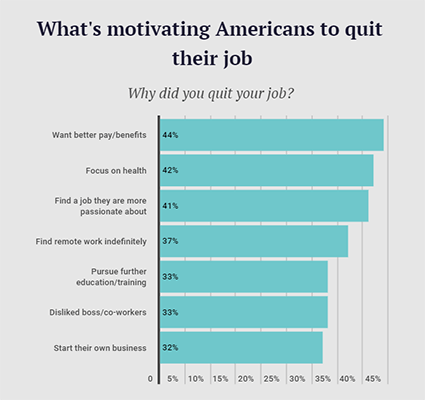
You don’t need a huge capital to get started
According to Sumo, you only need $50 to get an ecommerce business going.
Unlike starting a brick-and-mortar store, setting up ecommerce websites is relatively cheaper. And if you start a dropshipping business, you might not even need startup capital at all.
Having a physical store means you need to stock up on products. Not only should you have products available in your stockroom, but customers should also find them on the main floor. That’s not the case with online shopping sites since some products can be made to order.
And you don’t have to pay for rent, employees, and other expenses commonly associated with brick-and-mortar stores. That’s a big deal for entrepreneurs that are just starting.
You don’t have to pay as many employees
Imagine how many employees you’ll need to hire if you put up a physical store. Now think about how much it would cost to train each employee. One source reveals that small businesses pay the most for training at $1,433 per employee.
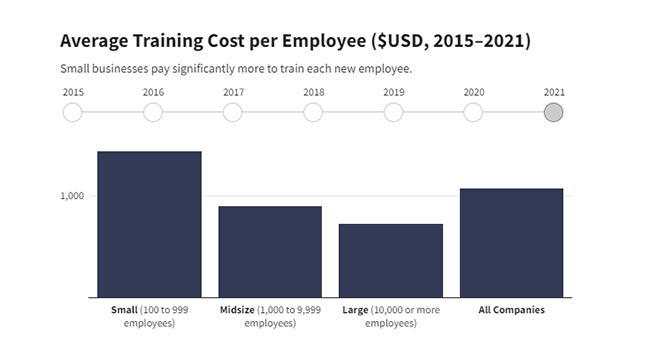
That’s not the case for those that run online stores. The reality is that a single person can run an online store, especially in the beginning. And while you may need to add more people to your operations as you grow, you still won’t hire as many employees as you would if you have a brick-and-mortar store.
Since online stores can be run from home, some business owners have their relatives help out when they need a hand with orders or the marketing side of things. In terms of marketing, you’ll want to automate what you can. Marketing automation software and social media automation tools will be critical to help you here.
You sell anytime, anywhere
It doesn’t matter where you are in the world or what time it is. Your online store will continue accepting orders as long as it’s live on the internet. Rain or shine. Night or day. It doesn’t matter. You’ll get those orders.
Of course, you’ll want to have someone available to handle orders before you run off somewhere. But you get the picture. An online store will always remain open.
And just as important, your online store will remain accessible no matter where your customers are. All they need is an internet-connected mobile device to get on your ecommerce website.
SaleCycle’s data shows that while there is a dropoff after 10 PM, customers will still access ecommerce services online. That means people will continue to buy even in the early hours of the day when most people are asleep.
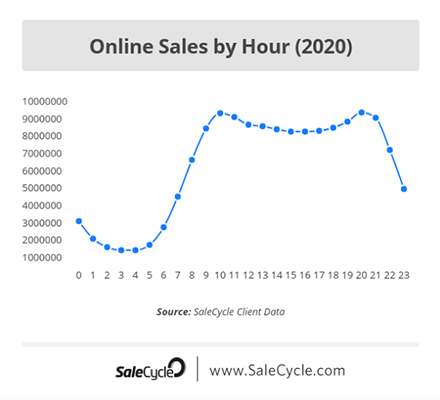
You collect customer data
Unlike traditional brick-and-mortar stores, online shopping sites are able to collect customer data such as their names, email addresses, and other useful information.
Why is that important?
First off, you can use this data to contact customers and build a relationship with them. You can send emails about the promotions you’re having. And because you have their data, you’ll know what products they’re already interested in.
Customer data can also help improve your site and services. You’ll know which products aren’t working out. And you’ll know which features your customers find most useful.
You can even use surveys to get more specific data out of them.
You reach more customers
Brick-and-mortar stores are great but they can only reach so many people. If you are set on growing your business, you’ll definitely need to put up an online store.
Ecommerce stores are flexible when it comes to targeting the right people. Using search engine optimization (SEO), you can target specific communities, districts, cities, states, regions, or countries.
And with digital marketing strategies like retargeting ads, every person who’s been on your site can get served ads based on their actions. For example, if someone reads a blog post on your site and then exits, that person will see an ad for your products.
The potential to reach more customers and earn more is far better when you have an online store.
You highlight specific products
When you have a brick-and-mortar shop, there’s only so much you can do to highlight a best-selling item. You can put it by the window for everyone to see from the outside. You can have it sitting in front of the door for people to notice as soon as they walk in. That’s about it.
But online retailers use several tricks to showcase specific products.
Not only can the homepage force visitors to see the product, but it can also serve them text or videos to highlight what the product does. An online store owner can also use pop-up ads, banners, and call-to-action buttons to draw the attention of site visitors.
You create a customized customer experience
You can provide a personalized customer experience to customers. Just like how two customers from different parts of the world might end up on different homepages even though they’re accessing the same domain.
Websites can also show their prices in different currencies based on a user’s location.
If users are logged into the site, they might see their names displayed on the homepage. And they’ll have their preferences saved. They’ll feel right at home whenever they visit.
What’s even more important is that their shopping carts will still be there waiting for them. That’s not something every customer can do when they shop at physical stores.
SuperOffice asked 1,920 business professionals what their top priority for the next five years will be. 45.9% said that they will prioritize the customer experience.
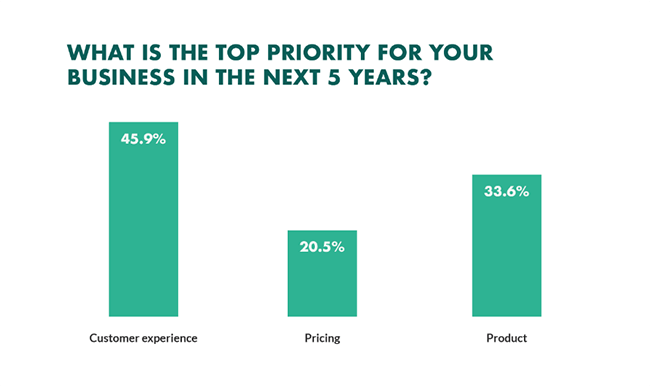
You make it easier for customers to shop
Shopping at physical stores can be intimidating for some customers, especially those who aren’t comfortable interacting with others. And that’s mainly the reason why some people prefer to buy their needs from ecommerce platforms.
When you shop online, you’re free to browse at your own pace. Nobody’s staring down your shoulder. There’s no aggressive salesperson who’ll bother you. Customers can shop in peace.
As an online seller, you’re going to make it so much easier for your customers to buy the things they need.
The important thing to remember is that you’ll still need to be reachable should your customers need you. Live chat, phone numbers, contact forms, FAQs, chatbots — these go a long way toward satisfying customers.
SalesForce says that 91% of customers that get a positive experience are more likely to make another purchase.
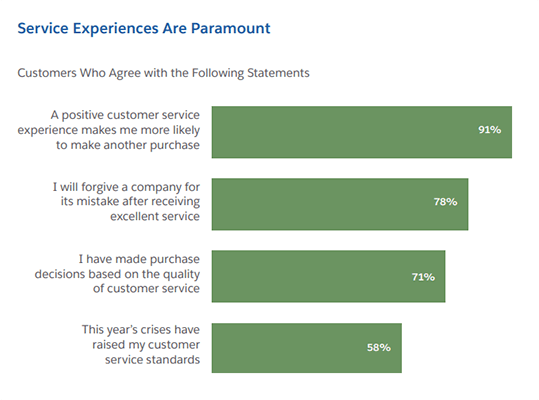
You process high-volume orders
When you’re selling online, you don’t have to worry about a sudden burst of orders coming in. As long as you have a sound infrastructure in place, your online store should be able to handle high-volume orders.
It’s even easier for those of you who are using the dropshipping model. Dropshipping suppliers are well-equipped so they’re more than capable of handling large order quantities. All you have to do is sit back and watch your online sales go up.
You grow your business more easily
It’s wonderful how scalable an ecommerce business can be. When you have a physical retail store, you’ll be forced to move into a larger facility if you want to expand. But online selling sites can accommodate any number of customers if you have the infrastructure for it.
You have access to analytics
People that run retail stores can do daily inventories to check which products people buy the most. But what about all the other details? How many people drop by each day? Which section of your store do they typically head to after entering? What makes them put items back on the shelf?
Who keeps track of this useful data?
When you have an online store, you get access to important analytics data that can help you improve your business and drive more online sales. You can also come up with a solid business strategy if you have analytics. And if you integrate Google Analytics into your site, you’ll get to know who your customers are a little better.
In a survey, McKinsey says 29% of survey respondents believe that the use of customer analytics is “extremely important” when it comes to the commercial success of a company.
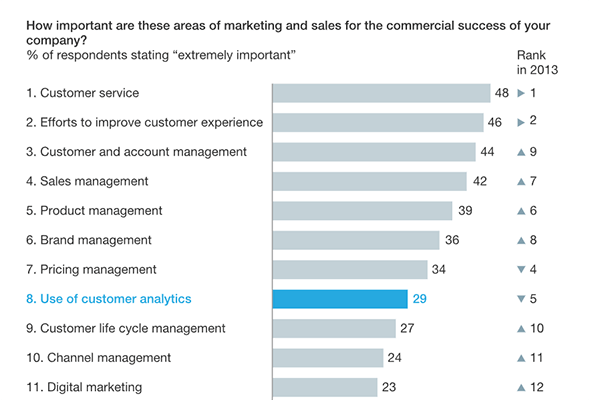
The disadvantages of starting an online business
Small business owners should be excited about building an online platform. But before they do, they should first look at the disadvantages of selling products online.
You don’t get to talk to customers directly
Are you the type of entrepreneur who likes building personal relationships with customers? Then sadly, ecommerce solutions might not be the right path for you.
As you can imagine, you don’t get to know your customers since all transactions happen online. There are plenty of ecommerce benefits but getting to know your customers personally isn’t one of them.
That’s the price businesses pay for better efficiency.
You have to deal with shipping
All physical retailers have to do to close transactions is wrap up whatever products customers buy and send them on their way. But if you’re running an ecommerce business, you’ll have to deal with shipping — and all of the many issues associated with it.
Sure, there are ecommerce stores that can handle next-day or even same-day deliveries. But if you’re a new player in the market and you don’t have an infrastructure in place, then you might not be able to compete with businesses that can deliver much faster than you.
Also keep in mind that if you have to create or customize a product (custom shirt prints, for example), then it might even take longer before a product can be sent to a customer.
Studies show that 40% of US consumers are willing to wait 2 days for fast shipping.
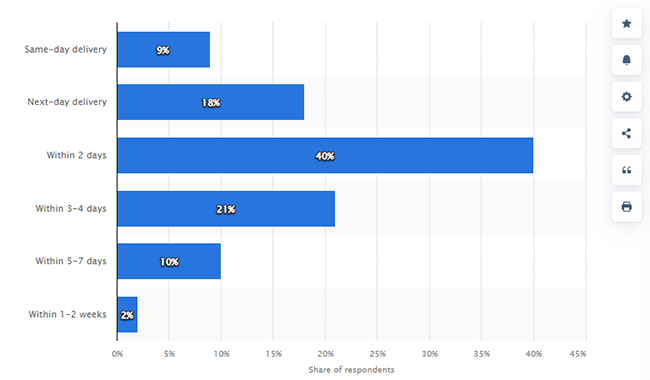
However, if you opt for the dropshipping business model, your dropshipping supplier will handle shipping for you.
You deal with security issues
There are so many security issues that you have to be aware of. You can fall victim to phishing, malware, and ransomware attacks. And the sad thing is that many small businesses don’t know how to deal with these attacks. So they either have to hire a cybersecurity expert (which can be expensive) or use an ecommerce platform that has built-in security features.
If you don’t deal with security issues properly, then hackers might get a hold of your customers’ email addresses, credit card information, and other data that could put them in compromising situations.
Those who fail to respond properly to these sorts of attacks lose their credibility as small business owners. You don’t want that to happen to you.
Now, while security issues will be a factor, it’s no reason to avoid starting a business. You can, however, put measures in place to minimize the risk of these issues occurring.
You have more competitors
When you bring your business online, you’re setting yourself up to compete with other companies. It doesn’t matter whether you’re targeting a local audience or trying to go nationwide or global. You will encounter a ton of competition.
That means you’ll have to learn how to set your brand apart from everyone else’s.
Here’s a tip:
If you don’t have a product to sell just yet and are open to exploring product categories, you can look for product ideas that have strong demand but low competition. You can use keyword research tools to determine which products aren’t as competitive.
You deal with site crashes
You don’t need to be attacked by hackers for your ecommerce site to go down. Sometimes a site would randomly crash out of nowhere because the hosting platform would run into issues. And when that happens, there’s nothing you can really do but wait. That’s why you should only work with the best dedicated server hosting providers.
A site can also crash if there’s a sudden spike in web traffic. If all of your customers try to access your domain all at once because of a promotion you’ve got going on, then you’ll need to prepare for the worst.
You’re bound to lose more sales the longer the outage lasts. Even worse, you might lose potential customers forever if they have an awful experience.
Gartner says that the average cost of network downtime is $5,600 per minute.
But it’s worth noting that if you run your ecommerce store on a hosted platform like Shopify or Sellfy, they’ll handle these technical issues for you.
You have to learn online marketing
It’s inevitable. When you start selling products online, you’ll have to learn online marketing. It’s the only way you’ll be able to compete with many businesses and reach customers. Those that have some experience with digital marketing have a huge advantage.
For some people, however, this isn’t such a big deal. There are already plenty of resources online that teach small businesses how to market themselves online. And there are tools available that can make marketing so much easier.
But for some people, having to learn a whole new skill set might be a dealbreaker. If you belong to this camp, you might want to try to look into hiring freelancers to help you pump out marketing content for your business. This can include hiring writers, graphic artists, and social media experts.
Or you can hire a marketing expert or two who can help you run your marketing campaign while you focus on tasks that only you can handle.
You have to be careful about which products to sell online
With ecommerce, there are products that are tough to sell because of shipping concerns. While you can pack frozen products with dry ice when you ship them to customers, that can get expensive real quick.
And even putting products in heavy containers like cupcakes in jars can start to eat away at your profit before long.
Then of course you have products that are so fragile that they could break midway through shipping. Replacing these items can be really tough especially if you’re not sure who caused the damage to begin with.
So there are some products that you’d probably have a hard time selling online. This means you’re kind of limited to items that are easy and inexpensive to ship to customers.
Related: The Best Products To Sell Online (Top Picks)
Frequently Asked Questions
What are ecommerce risks?
One of the biggest risks of launching an ecommerce site for small business owners is not knowing how to resolve technical issues like site crashes or hacking.
How is emarketing less risky?
Advertising is better when you shift online. It’s more affordable than traditional advertising channels.
What is an ecommerce business example?
The best example of an ecommerce business would be Amazon. Walmart also has an ecommerce store.
Is ecommerce a good business move?
Yes. Many businesses see the need to have an online presence. The ecommerce market is continuing to grow today.
What ecommerce business is most profitable?
There are plenty of ecommerce businesses in the health and beauty category that perform well. Clothing and apparel is also a big category.
Final thoughts
Starting an ecommerce business isn’t easy but with dropshipping websites and print-on-demand services, it’s definitely getting easier.
We’ve talked through a number of advantages and disadvantages to starting an online business.
And while the downsides to online business are an issue, none of them are a good enough reason to avoid launching your own store.
You just need to be aware of them so you can put steps in place to mitigate their impact on your business.
Finally, if you’re not sure how to get started, check out our comparison of the top ecommerce platforms to power your store.
